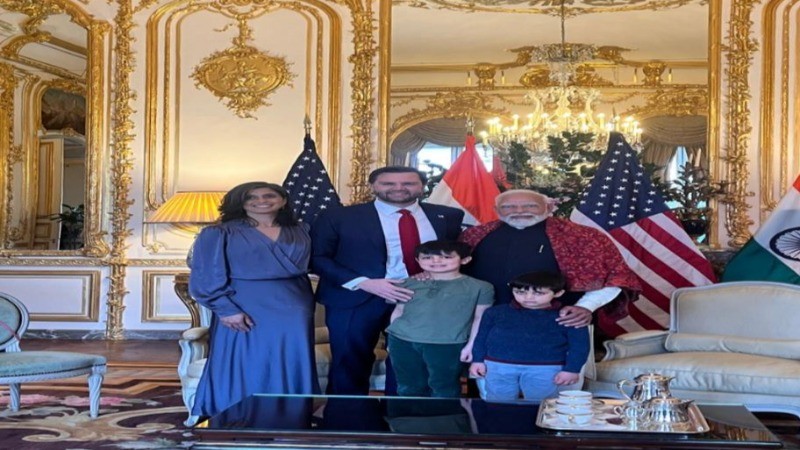
Prime Minister Narendra Modi met US Vice President J.D. Vance in Paris to talk about strengthening energy cooperation. The discussion focused on how the US can help India expand its energy sources by investing in American nuclear technology.
The meeting happened during an AI summit in Paris. Vice President Vance’s family also joined, including his wife, Usha Vance, who was born in India, and two of their three children. Modi shared gifts with them and wished their son Vivek a happy birthday.
After the meeting, Modi posted on social media X, saying, “Had a wonderful meeting with US Vice President J.D. Vance and his family. We had a great conversation and celebrated the birthday of their son, Vivek!”
Vice President Vance shared more details about their conversation. He said they talked about how the US can support India in using clean and reliable nuclear technology.
India recently announced plans to amend nuclear laws to boost its nuclear energy capacity to 100 GW by 2047. Foreign companies have hesitated to invest in India’s nuclear sector due to liability concerns, and these changes aim to address the issue.
After his visit to Paris, Modi will head to Washington, D.C., where he is scheduled to meet US President Donald Trump. This will be their first in-person meeting since Trump started his second term. The two leaders have a strong relationship, and Modi will be among the first foreign leaders to meet Trump. Their discussions will mainly focus on trade and energy, and a joint statement will be released after the talks.
Modi-Trump Meeting: Key Talks on Nuclear - Prime Minister Narendra Modi is set to meet former US President Donald Trump on February 12-13, with energy cooperation, trade, and immigration among the main topics. The discussions are expected to strengthen ties between India and the US, especially in nuclear energy and bilateral trade.
Modi’s visit is expected to highlight India’s interest in expanding nuclear power. India is looking at small modular reactors to reduce its reliance on fossil fuels. The government has already committed large investments in nuclear research and is working on policy reforms to attract private players. However, challenges remain due to strict nuclear liability laws.
India is also keen on increasing its energy imports from the US. The US is now one of the largest suppliers of crude oil and liquefied natural gas (LNG) to India. Talks may include securing long-term LNG contracts with American suppliers.
Another key issue will be immigration. India has recently repatriated over 100 of its citizens following US deportation orders, and more discussions are expected on handling deportations.
Modi is also expected to push for more H-1B visas for skilled Indian workers. The US H-1B visa program is crucial for Indian IT professionals, and Trump has previously supported it.